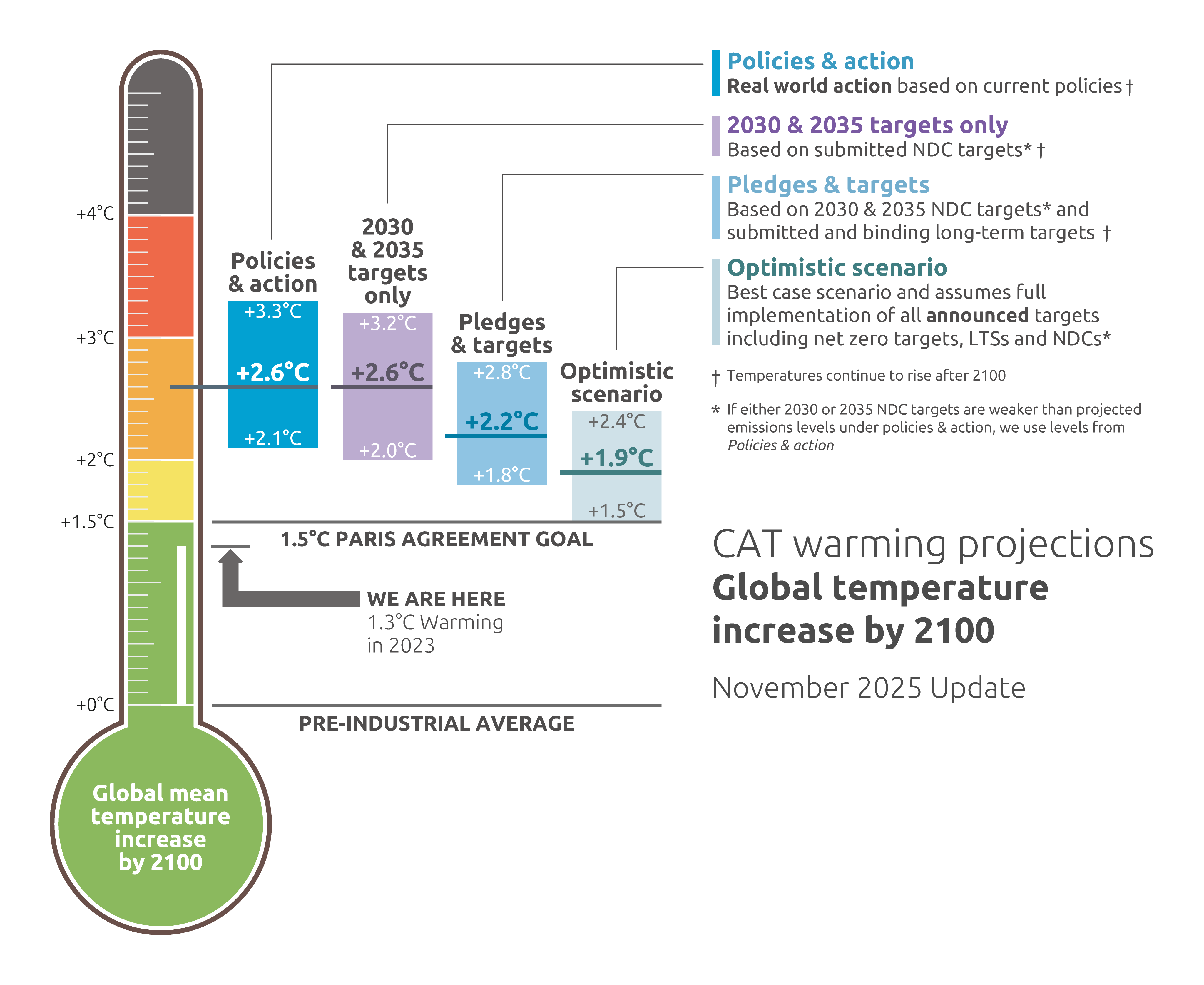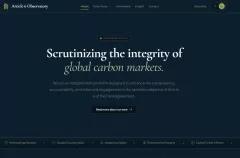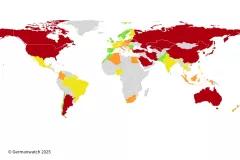Ten years after the Paris Agreement, the world stands at a critical juncture in the fight against climate change, with little to no measurable progress in warming projections - for the fourth consecutive year, said the Climate Action Tracker in its global update, released at the climate talks in Belém, Brazil, today.
- The warming projection for the CAT “2030 and 2035 targets scenario”, which estimates the impact of submitted climate targets (NDCs) to date, remains at 2.6°C, the same as last year. In other words, the 2035 NDCs so far submitted don't change the dial in terms of keeping warming to 1.5˚C.
- Almost none of the 40 governments the CAT analyses have updated their 2030 target, which is critical to keep warming levels below 1.5°C, nor have they set out the kind of action in their new 2035 targets that would change the warming outlook.
- Warming under governments' policies and climate action – the CAT's Current Policies Pathway – has seen a small 0.1˚C drop, from 2.7°C to 2.6°C, but largely due to a CAT methodological update to extend and better reflect China’s emissions pathways to 2100, rather than new and substantial policy action.
- The “pledges and targets” scenario, which includes 2030 and 2035 NDCs and net zero targets submitted under the Paris Agreement, has slightly worsened, moving from 2.1°C to 2.2°C, largely because of the US withdrawal from the Paris Agreement which effectively invalidated all of its targets.
- The CAT's most “optimistic scenario”, assuming full implementation of all announced targets, remains at 1.9°C – still well above the Paris Agreement's warming limit.
Since 2020, greenhouse gas emissions have remained at the same levels - if not increased - as a result of the ongoing fossil fuel-intensive activities and added infrastructure allowed by governments who have continued to ignore the increasingly urgent warnings.
"The consequences of delay go beyond lost time: instead of building momentum, it fuels doubt and erodes trust in the process. With many governments yet to submit their 2035 NDCs, policymakers and observers are entering COP30 with an incomplete picture of national commitments and the overall level of ambition – making it difficult to assess global progress and hold governments accountable," said Ana Missirliu, of CAT partner organisation NewClimate Institute.
"The world is running out of time to avoid a dangerous overshoot of the 1.5°C limit. Delayed action has already led to higher cumulative emissions, and new evidence suggests the climate system may be more sensitive than previously thought. Without rapid, deep emissions cuts – over 50% by 2030 – overshooting 1.5°C becomes ever more likely, with severe consequences for people and ecosystems," said Bill Hare, CEO of Climate Analytics
The CAT pointed to the continued production and expansion of the fossil fuel industry as one of the main drivers of the emissions crisis.
“While not at the pace needed, our analysis shows that the Paris Agreement works,” said Prof Niklas Höhne, of NewClimate Institute, a CAT partner organisation.
“Back in 2015, our current policies scenario led to 3.6°C of warming by 2100. Today, ten years later, our latest projections show that this has been reduced by roughly 1°C to around 2.6˚C. The Paris Agreement has rewritten the rules of global climate action - sparking investment, innovation, and reforms that would simply not have happened without it.”
“But governments need to speed up the pace now. Although emissions have risen, the exponential pace of the renewable energy expansion allows us to now reduce emissions much faster than previously thought. Governments can strengthen or overachieve 2030 targets, implement robust policies, and ensure transparency and accountability to deliver on the Paris Agreement promise and safeguard a sustainable future," concluded Höhne.
"We have said it before, and we will keep saying it: we are running out of time," said Sofia Gonzales-Zuñiga, report lead author, of Climate Analytics.
"Every new fossil gas deal the EU makes, every new coal plant built in China, every fossil gas expansion project in Australia, every exported barrel from Norway, every tonne of LNG Japan pushes into neighbouring Asian countries, costs billions to people elsewhere in the world as they deal with increasingly extreme weather events. These are not abstract policy choices – they are physical realities with human consequences. The atmosphere does not negotiate, and it does not wait."
Press contacts:
@email









